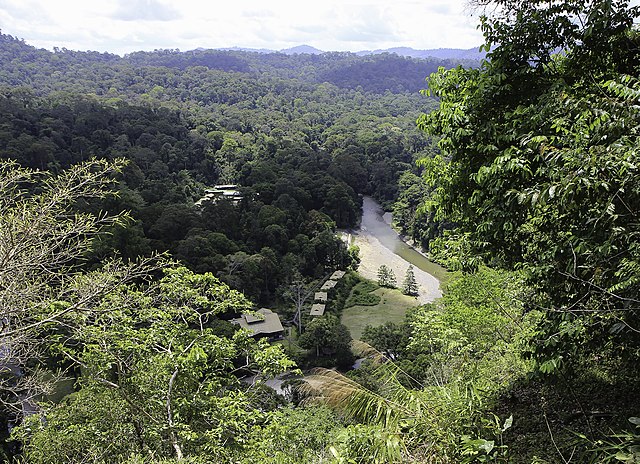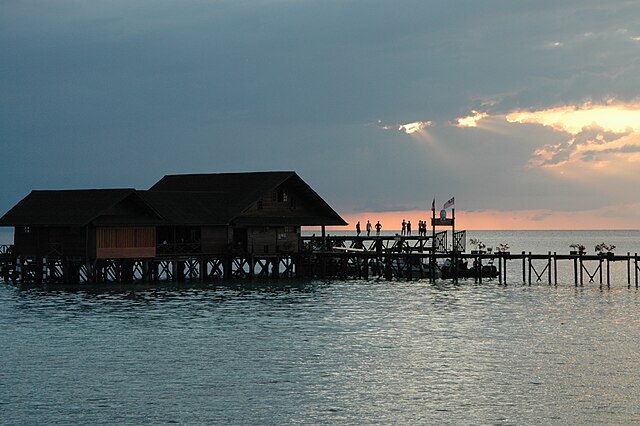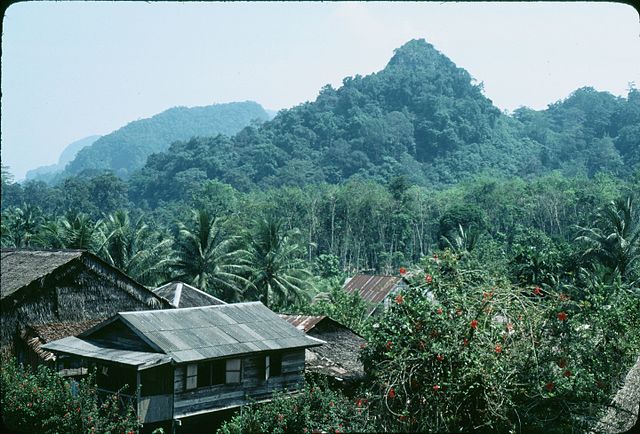
Thammasat University students interested in development studies, ecology, environmental studies, business, economics, political science, ASEAN studies, Borneo, international law, sociology, and related subjects may find it useful to participate in a free 16 June Zoom webinar on Transforming Borneo: From Land Exploitation to Sustainable Development.
The event, on Friday, 16 June 2023 at 9am Bangkok time, is presented by ISEAS – Yusof Ishak Institute, Singapore.
The TU Library collection includes several books about different aspects of life in Borneo.
Students are invited to register at this link:
https://us06web.zoom.us/webinar/register/WN_y8UC4DX2QjOUSMFyo2V7Ug#/registration
The event announcement states:
About the Webinar
Borneo, the world’s third-largest island, was long regarded as a relatively ‘marginal’ region in Southeast Asia. However, its position has undergone a remarkable transformation in recent years. The plan to relocate Indonesia’s capital to East Kalimantan, accompanied by several mega projects, along with the rise of Sarawak and Sabah in Malaysia’s political landscape, have brought unprecedented attention to Borneo. This is further fuelled by the recent rush for carbon offsetting and renewable energy, which recognizes the island’s abundant carbon stock and potential for hydropower and biomass.
This webinar will focus on how the island has changed over the past two decades across the diverse territories that comprise contemporary Borneo. It aims to provide an overview of Borneo, from big-picture questions to the complexities on the ground, with a particular emphasis on the rapid and large-scale land use changes that have occurred throughout the island since the 2000s. The webinar seeks to offer perspectives on balancing the future, considering the need for economic and social development while steering trajectories towards a better and more sustainable Borneo.
About the Speakers
Chun Sheng Goh, Ph.D. (Utrecht), is an Associate at Harvard University Asia Center.
Associate Professor Lesley Potter has 40 years’ experience conducting field-based research in Indonesia, especially Borneo.
The book by Dr. Goh and Associate Professor Potter, Transforming Borneo: From Land Exploitation to Sustainable Development’ was recently published by ISEAS – Yusof Ishak Institute and is available to TU students through the TU Library Interlibrary Loan (ILL) service.

Earlier this month, an article by Dr Goh in the Borneo Post noted:
Facing the paradox
Like many other parts of the world, Borneo has been subject to the ideology of neoliberalism in the past decades, seeking to prioritise economic growth above all else. This has led to the exploitation of Borneo’s forests, minerals, and wildlife, contributed to various social issues, and exacerbated the challenges of climate change.
There has been a growing call to redefine prevailing notions of economic growth and embrace a new ecological-social model. The alternative would prioritise the well-being of both people and the environment, shifting the focus away from the interests of corporations and investors.
However, the drive for material expansion remains deeply ingrained in society and cannot be easily disregarded.
The individuals we spoke to throughout the journey revealed that they had displayed adaptability in the face of rapid changes and eagerly anticipated even more significant and faster transformations brought about by the ongoing and upcoming mega projects.
They expressed a positive, and even excited, outlook regarding these new developments, especially the Nusantara project. I have heard honest confessions that people are prepared to accept the potential negative impacts that may arise from development as long as the country progresses and aligns with global trends, ultimately leading to improved livelihoods for them.
I constantly reminded myself that these viewpoints do not necessarily reflect the opinions of every individual in the province, especially those who were victimised by these ‘global trends’.
Nevertheless, I do believe there is a strong desire among the local people to be actively involved in decision-making processes, especially in matters directly affecting them, such as roads, land rights, and education – “We want a seat at the table, and we will fight hard for it”.
This creates a paradoxical situation. On one hand, local communities are strongly committed to defending their rights, lands, and culture. But on the other hand, their thirst for development has fuelled an obsession with economic growth, even at a cost.
Particularly emphasised is the importance of leveraging relationships with neighbouring countries. Aligned with the policy of ‘develop from the periphery,’ it appears that people believe Indonesia should and will continue to proactively pursue cooperation with its neighbours.
However, I have also observed that this approach is being implemented without regard for whether the neighbours are ready or not. The completed but non-operational Pos Lintas Batas Negara (PLBN) on the Indonesian side of Sebatik Island serves as a vivid example of this situation.
‘The unquenchable thirst’
Before bidding farewell to North Kalimantan, we returned to Tawau aboard the same express boat that had initially brought us to this restless land. We travelled to the Nunukan jetty in a small van.
Our driver, originally from Timor, had previously worked at SFI in Sipitang before settling in Nunukan. He moved back to Indonesia to ensure his three children could attend university.
As we navigated the narrow roads of this charming town, we arrived at the jetty before 8am. The process of purchasing tickets and going through immigration clearance went smoothly.
While waiting for the boat to depart, I suddenly felt a strong thirst, likely due to the overly salty food that I had consumed in the past few days. The guy carrying bottled drinks walked back and forth, but his sugary beverages would not quench my thirst.
I noticed a large ferry in the distance, which we learned had travelled from Sulawesi, carrying thousands of passengers over a two-night journey to Nunukan. Within an hour, our boat filled up with people disembarking from the ferry – young and old, in groups or alone, adorned in stylish attire or maintaining a low profile.
I could not help but wonder what their purpose was in Sabah. However, one thing was certain for me – they all carried a deep longing for a better life, whether it was to send their children to universities, or just to buy the latest iPhones.

In March, a Borneo Sustainable Development Goals Summit 2023 was held. Among the events was a Roundtable Discussion: What if Labour Shortage Is a Long-Term Threat to a Sustainable Recovery for Tourism? | Presented by Curtin University Malaysia:
Curtin University Malaysia is proud to present an exciting roundtable event titled “What if Labour Shortage Is a Long-Term Threat to a Sustainable Recovery for Tourism?” on Saturday, 18 March 2023, from 13.00 to 14.30 am. This hybrid event, held during the Borneo SDG Summit at Miri, Coco Cabana, aims to bring together top-level representatives from government and industry to discuss the growing issue of labour shortage in the tourism sector. […]
The tourism and hospitality sector has been struggling with low wages, long working hours, weekend work, and emotional labour. The COVID-19 pandemic has further increased the disadvantages of working in this industry, leading to growing job insecurity and vulnerability. According to the Malaysia Hotel Association, about 20% of the global tourism workforce got lost worldwide during the pandemic. As the industry enters the recovery phase, it faces severe talent management challenges, including severe labour shortages. For instance, more and more vacant GM positions have emerged all over Sarawak, leading to businesses not operating at full capacity or the usual quality level. Additionally, airports and airlines are facing bottlenecks in their regular operations. To sustain the sector’s projected growth of 50% by 2030, it needs an additional 17,500 staff each year.

(All images courtesy of Wikimedia Commons)
